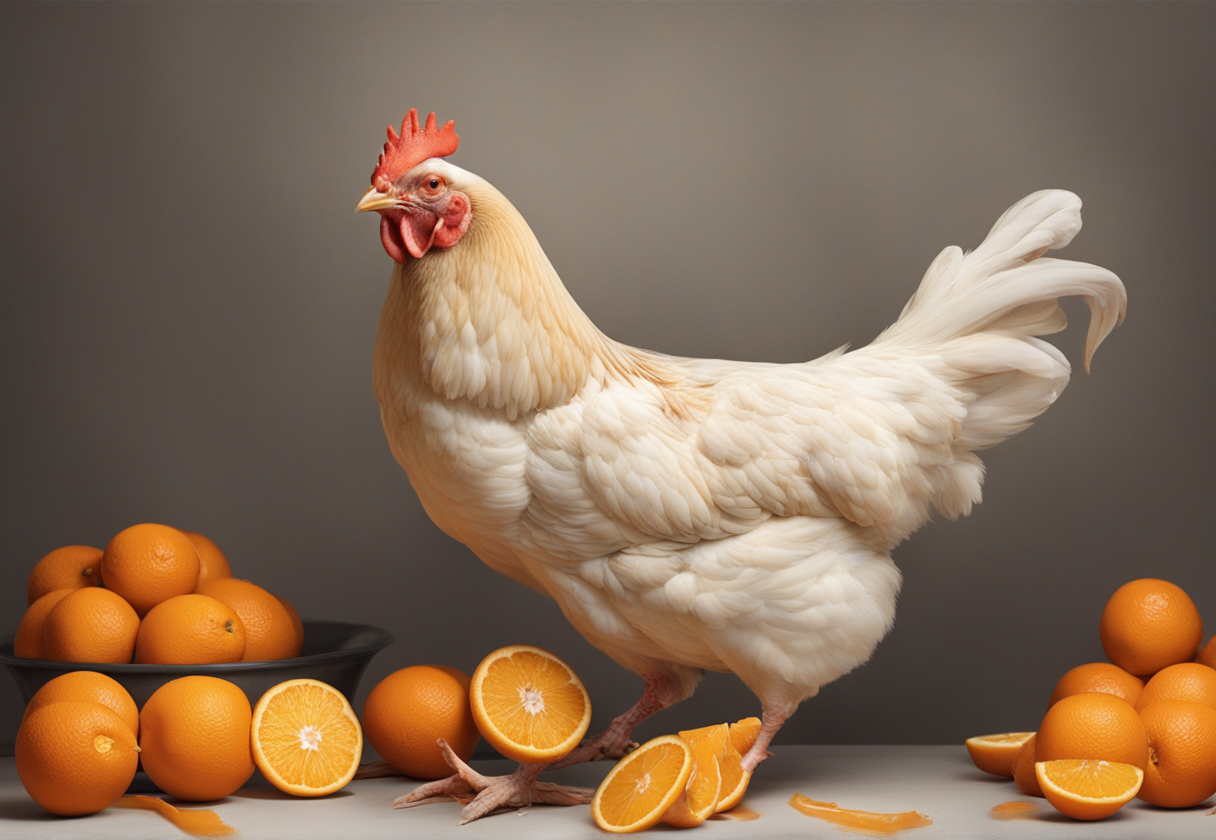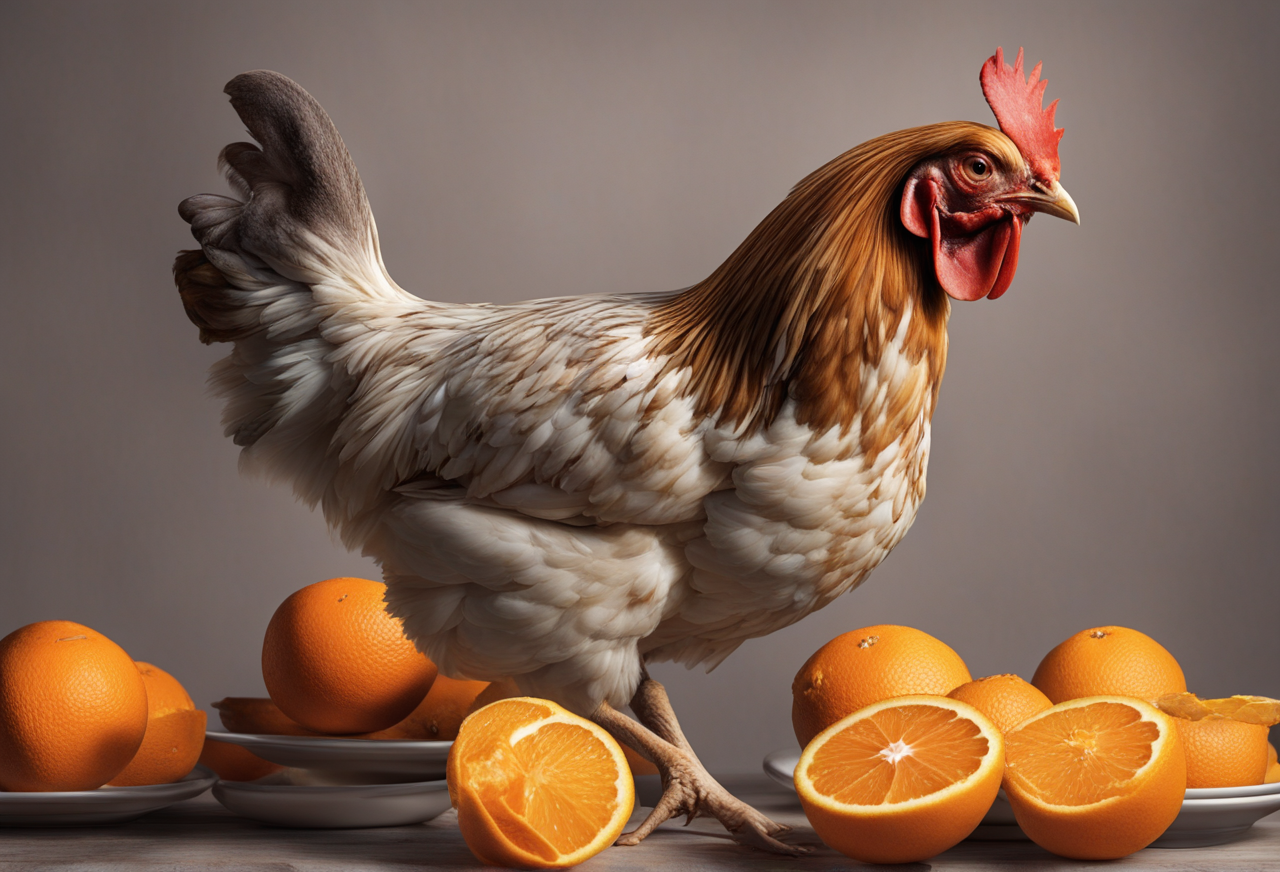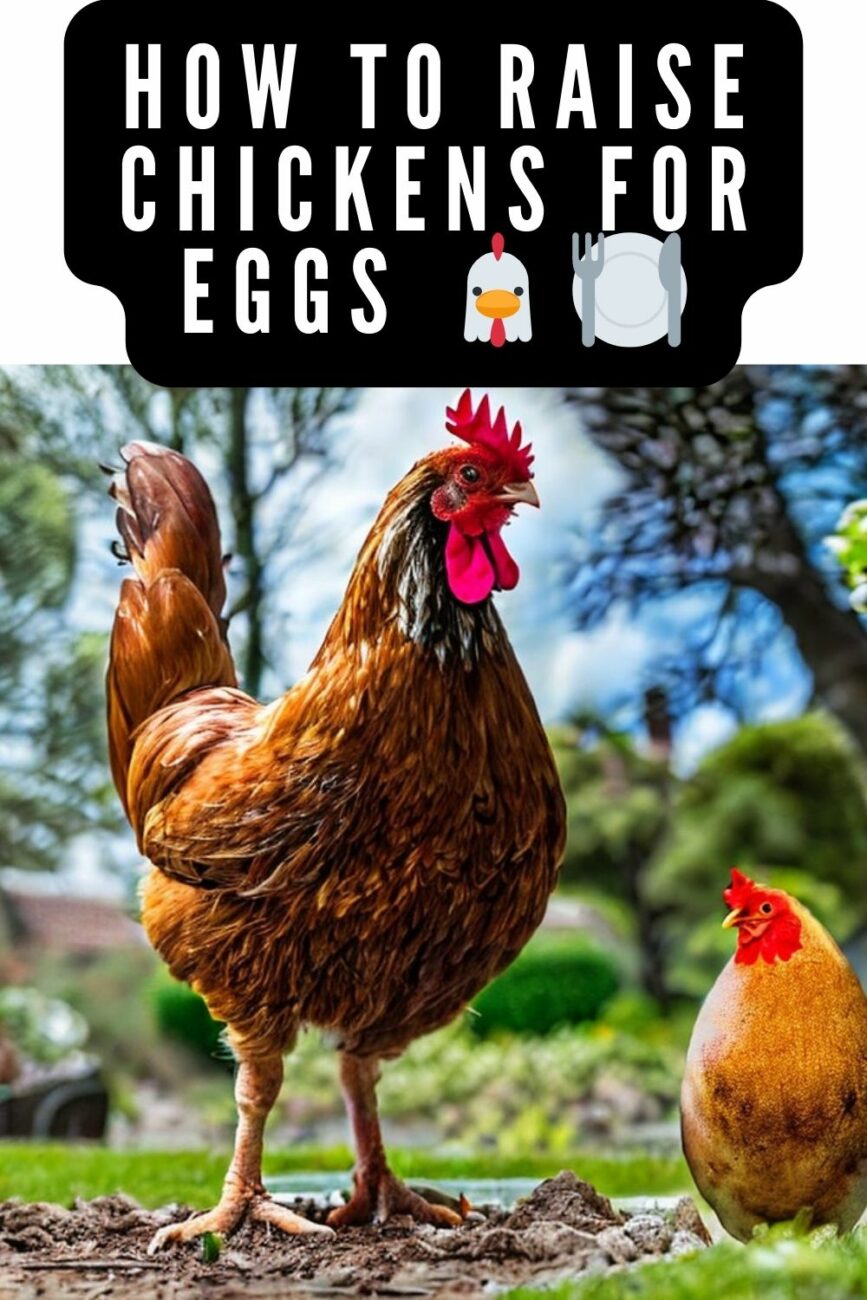Well folks, I learned the hard way that chickens will eat pretty much anything you put in front of them.
A few years back when I first got my little flock of 6 layers, I was eating an orange one sunny morning out by the coop.
My buff orpington hen Sweetie strutted right over staring at me with laser focus.
Before I knew what was happening, she had jumped up trying to peck the orange right out of my hand!
The short answer is yes, chickens can and will eat oranges and the peels if given the chance.
However, oranges should only be an occasional treat due to their high natural sugar content.
That little episode with Sweetie sparked my curiosity.
Are oranges and the peels actually safe and healthy for chickens to eat?
I decided to do some researching from reliable sources like my local agricultural extension office and veterinarian.
Here’s a detailed breakdown of what I learned…
Nutrition in Oranges and Peels
Oranges are packed with beneficial nutrients like vitamin C, potassium, thiamine, folic acid, and antioxidants like carotenoids and flavonoids.

The peel contains even higher concentrations of protective compounds like vitamin A, calcium, magnesium, and dietary fiber.
So in moderation, oranges can make a nutritious supplemental treat for chickens. The vitamin C helps with collagen formation and is an immune system booster. The antioxidants can promote overall health. The fiber in the peels aids digestion.
However, oranges are also high in natural sugars with around 14 grams per fruit. Too much sugar can cause issues like weight gain, fatty liver disease, and potentially vent prolapse in extreme cases.
So oranges should be fed sparingly as part of a balanced diet, no more than 1-2 segments 2 times per week. The peel provides more nutrition than the fruit itself, so focus on that as the treat over the juicy orange wedges.
Are the Peels Safe?
Yes, orange peels are totally edible and safe for chicken consumption.

The outer peel contains no toxic compounds. But there are a few things to keep in mind:
- Wash oranges thoroughly before feeding to remove any pesticide residue.
- The tough texture means peels can be choking hazards if swallowed in large pieces. Peel the oranges and chop the peel into bite-size bits first.
- The peel takes longer to break down, so only feed small amounts to avoid digestive issues.
An older study also found orange peels may impact egg yolk pigmentation. But the amounts fed in the study were extremely high. With moderation, orange peels are a safe, nutritious treat.
The Best Way to Feed Oranges
Since whole orange wedges present a major choking risk, it’s best to peel and separate oranges before feeding to your flock.

Here are some tips:
- Wash the orange thoroughly before peeling.
- Use a sharp knife to peel the rind and inner white pith off completely.
- Gently separate the orange into segments and cut each segment into bite-sized pieces.
- Chop the peeled rind into tiny pieces as well.
- Mix together the chopped orange and rinds to feed.
- Offer just a few small handfuls per chicken as an occasional treat.
I like to save excess orange peels and scraps in a gallon bag in my freezer. Whenever I bake treats like muffins or chicken scratch, I’ll throw some frozen peel pieces right into the batter or scratch mix. My flock goes crazy over those fun recipes with the pop of citrus!
Monitoring treat intake and diet variety is key when feeding human foods like oranges. But used responsibly, they can be a safe, nutritious supplemental feed.
Exploring Other Citrus Delights
Oranges are just the tip of the citrus iceberg when it comes to treats for your feathered friends. While oranges are generally safe in moderation, it’s worth exploring other citrus fruits to add variety to their diet.
Tangy Tangerines: Tangerines, with their sweet and tangy flavor, are usually well-received by chickens. Like oranges, they are rich in vitamin C and antioxidants. However, the same precautions regarding sugar content apply, so offer them in moderation.
Lovely Lemons: Lemons, while safe for chickens in small amounts, should be given sparingly due to their high acidity. The vitamin C and citric acid can be beneficial, but excessive consumption may lead to digestive issues. Consider offering small lemon wedges as an occasional treat.
Charming Clementines: Clementines are a popular choice among chickens for their manageable size and sweet taste. They are a good source of vitamin C and contain fewer seeds than some other citrus fruits. As with any treat, moderation is key to prevent potential health issues.
Grapefruit Goodness: While grapefruits are safe for chickens, their tartness may not be as appealing to some birds.
If your flock enjoys the taste, feel free to offer small, peeled segments. However, be mindful of the sugar content and keep portions in check.
Remember, introducing new treats should be a gradual process, and observing your chickens’ reactions can guide you in determining their preferences. Each chicken may have its own citrus favorite!
Citrus and the Egg Dilemma
One common concern among chicken keepers is whether feeding citrus fruits like oranges might affect the taste of eggs. While the impact is minimal, it’s essential to be aware of potential changes in egg flavor.
Subtle Flavor Influence: Citrus fruits, when fed in moderation, usually don’t impart a strong flavor to eggs. However, some keepers report a subtle citrus undertone, especially when chickens consume citrus regularly. If egg flavor is a significant consideration for you, it’s wise to monitor citrus treat frequency.
Quality Over Quantity: Maintaining a well-balanced diet for your chickens ensures high-quality eggs. While occasional citrus treats can be a delightful addition, the primary focus should be on providing a nutritionally complete layer feed and a diverse range of safe treats.
Testing the Waters: If you’re curious about the potential impact on egg flavor, consider conducting a short trial period.
Offer citrus treats for a week or two and assess whether there’s any noticeable change in egg taste. If the difference is minimal, you can confidently continue incorporating citrus into their diet.
Ultimately, the subtle influence of citrus on egg flavor is a minor consideration compared to the overall health and happiness of your flock. Strike a balance that aligns with your preferences while prioritizing your chickens’ well-being.
Beyond Oranges: Exploring Fruit Diversity
While oranges have their nutritional merits, a well-rounded diet for your chickens involves exploring a variety of fruits.
Different fruits offer unique benefits and flavors, contributing to a more diverse and interesting menu for your feathered friends.
Marvelous Berries: Berries, such as strawberries, blueberries, and raspberries, are not only delicious but also packed with vitamins and antioxidants. Their small size makes them convenient for chickens to peck at, and they can be scattered in the run for an engaging foraging experience.
Apple Appeal: Apples are a favorite among many chicken breeds. Ensure to remove the seeds and core before offering them, and consider slicing the apples into manageable pieces. The natural sweetness and crunch make apples a delightful and healthy treat.
Pear Pleasures: Pears provide a juicy and refreshing option for your flock. Like apples, removing seeds and cutting them into bite-sized portions is essential. Pears offer a good source of dietary fiber and essential nutrients.
Mango Magic: If you’re feeling adventurous, consider introducing mango to your chickens. Rich in vitamins and minerals, mango can be a tropical delight for your flock. Remove the pit and cut the flesh into small, manageable pieces.
Remember to introduce new fruits gradually and in moderation. This not only prevents potential digestive issues but also allows you to observe your chickens’ preferences. A diverse fruit selection ensures a colorful and nutritious diet for your feathered companions.
Homemade Citrus Treats: DIY Recipes for Delight
If you’re a fan of getting creative in the kitchen, consider whipping up some homemade citrus treats for your chickens.
These DIY recipes allow you to control the ingredients and provide your flock with tasty and nutritious delights.
Citrus Peel Chips: Slice citrus peels into thin strips and bake them in the oven until they become crispy. These citrus peel chips can be a crunchy and flavorful treat for your chickens. Ensure they are completely cooled before offering them to your flock.
Frozen Citrus Cubes: Mix small citrus segments with water and freeze them in ice cube trays. The resulting frozen citrus cubes can be a refreshing treat on hot days. Your chickens can peck at the cubes to enjoy the cool, fruity goodness.
Citrus-infused Grit: Enhance the nutritional content of grit by infusing it with dried and finely chopped citrus peels. This DIY citrus-infused grit not only aids digestion but also adds a zesty twist to your chickens’ diet. Offer it in a separate container for your flock to access as needed.
Experimenting with homemade treats allows you to cater to your chickens’ taste preferences while ensuring they receive a healthy and enjoyable supplement to their regular diet. Just be mindful of portion sizes and monitor their reactions to these delightful creations!
Balancing Act: Treats in the Chicken Diet
While treats like oranges and homemade delights add excitement to your chickens’ diet, maintaining a proper balance is crucial. Here are some essential considerations for ensuring treats complement, rather than overshadow, their primary nutrition:
Proportion Control: Treats should constitute only a small percentage of your chickens’ overall diet. The majority of their nutrition should come from a high-quality layer feed that meets their specific dietary requirements. Use treats as occasional supplements rather than daily staples.
Observation Is Key: Pay attention to your chickens’ reactions to different treats. If you notice any digestive issues, changes in behavior, or reluctance to eat their regular feed, it might be a sign to adjust or reconsider the treats you’re offering. Every chicken is unique, so being attuned to their individual responses is essential.
Seasonal Sensibility: Consider incorporating seasonal treats into your flock’s diet. For example, watermelon in the summer or pumpkin in the fall can provide variety while aligning with the natural availability of these treats. This also ensures a rotation of flavors and nutrients throughout the year.
Introduce Treats Gradually: When introducing new treats, do so gradually to allow your chickens’ digestive systems to adapt. Sudden changes in diet can lead to digestive upset, so take a patient and measured approach to treat integration.
By maintaining a thoughtful balance in your chickens’ diet, you contribute to their overall health and well-being.
Treats should be a delightful addition to their routine, enhancing their diet without compromising essential nutritional requirements.
